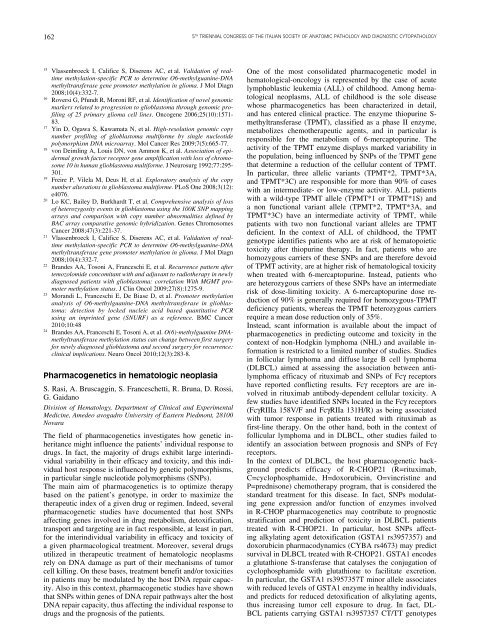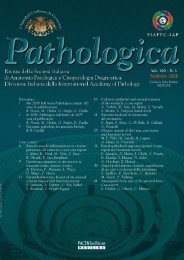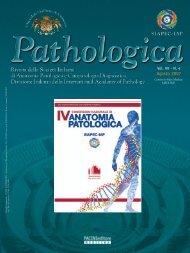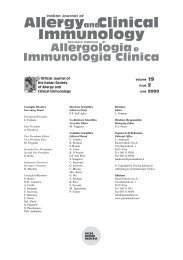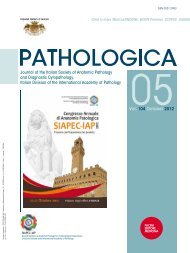Issue 4 - August 2010 - Pacini Editore
Issue 4 - August 2010 - Pacini Editore
Issue 4 - August 2010 - Pacini Editore
You also want an ePaper? Increase the reach of your titles
YUMPU automatically turns print PDFs into web optimized ePapers that Google loves.
162<br />
15 Vlassenbroeck I, Califice S, Diserens AC, et al. Validation of realtime<br />
methylation-specific PCR to determine O6-methylguanine-DNA<br />
methyltransferase gene promoter methylation in glioma. J Mol Diagn<br />
2008;10(4):332-7.<br />
16 Roversi G, Pfundt R, Moroni RF, et al. Identification of novel genomic<br />
markers related to progression to glioblastoma through genomic profiling<br />
of 25 primary glioma cell lines. Oncogene 2006;25(10):1571-<br />
83.<br />
17 Yin D, Ogawa S, Kawamata N, et al. High-resolution genomic copy<br />
number profiling of glioblastoma multiforme by single nucleotide<br />
polymorphism DNA microarray. Mol Cancer Res 2009;7(5):665-77.<br />
18 von Deimling A, Louis DN, von Ammon K, et al. Association of epidermal<br />
growth factor receptor gene amplification with loss of chromosome<br />
10 in human glioblastoma multiforme. J Neurosurg 1992;77:295-<br />
301.<br />
19 Freire P, Vilela M, Deus H, et al. Exploratory analysis of the copy<br />
number alterations in glioblastoma multiforme. PLoS One 2008;3(12):<br />
e4076.<br />
20 Lo KC, Bailey D, Burkhardt T, et al. Comprehensive analysis of loss<br />
of heterozygosity events in glioblastoma using the 100K SNP mapping<br />
arrays and comparison with copy number abnormalities defined by<br />
BAC array comparative genomic hybridization. Genes Chromosomes<br />
Cancer 2008;47(3):221-37.<br />
21 Vlassenbroeck I, Califice S, Diserens AC, et al. Validation of realtime<br />
methylation-specific PCR to determine O6-methylguanine-DNA<br />
methyltransferase gene promoter methylation in glioma. J Mol Diagn<br />
2008;10(4):332-7.<br />
22 Brandes AA, Tosoni A, Franceschi E, et al. Recurrence pattern after<br />
temozolomide concomitant with and adjuvant to radiotherapy in newly<br />
diagnosed patients with glioblastoma: correlation With MGMT promoter<br />
methylation status. J Clin Oncol 2009;27(8):1275-9.<br />
23 Morandi L, Franceschi E, De Biase D, et al. Promoter methylation<br />
analysis of O6-methylguanine-DNA methyltransferase in glioblastoma:<br />
detection by locked nucleic acid based quantitative PCR<br />
using an imprinted gene (SNURF) as a reference. BMC Cancer<br />
<strong>2010</strong>;10:48<br />
24 Brandes AA, Franceschi E, Tosoni A, et al. O(6)-methylguanine DNAmethyltransferase<br />
methylation status can change between first surgery<br />
for newly diagnosed glioblastoma and second surgery for recurrence:<br />
clinical implications. Neuro Oncol <strong>2010</strong>;12(3):283-8.<br />
Pharmacogenetics in hematologic neoplasia<br />
S. Rasi, A. Bruscaggin, S. Franceschetti, R. Bruna, D. Rossi,<br />
G. Gaidano<br />
Division of Hematology, Department of Clinical and Experimental<br />
Medicine, Amedeo avogadro University of Eastern Piedmont, 28100<br />
Novara<br />
The field of pharmacogenetics investigates how genetic inheritance<br />
might influence the patients’ individual response to<br />
drugs. In fact, the majority of drugs exhibit large interindividual<br />
variability in their efficacy and toxicity, and this individual<br />
host response is influenced by genetic polymorphisms,<br />
in particular single nucleotide polymorphisms (SNPs).<br />
The main aim of pharmacogenetics is to optimize therapy<br />
based on the patient’s genotype, in order to maximize the<br />
therapeutic index of a given drug or regimen. Indeed, several<br />
pharmacogenetic studies have documented that host SNPs<br />
affecting genes involved in drug metabolism, detoxification,<br />
transport and targeting are in fact responsible, at least in part,<br />
for the interindividual variability in efficacy and toxicity of<br />
a given pharmacological treatment. Moreover, several drugs<br />
utilized in therapeutic treatment of hematologic neoplasms<br />
rely on DNA damage as part of their mechanisms of tumor<br />
cell killing. On these bases, treatment benefit and/or toxicities<br />
in patients may be modulated by the host DNA repair capacity.<br />
Also in this context, pharmacogenetic studies have shown<br />
that SNPs within genes of DNA repair pathways alter the host<br />
DNA repair capacity, thus affecting the individual response to<br />
drugs and the prognosis of the patients.<br />
5 th triennial congress of the italian society of anatomic Pathology and diagnostic cytoPathology<br />
One of the most consolidated pharmacogenetic model in<br />
hematological-oncology is represented by the case of acute<br />
lymphoblastic leukemia (ALL) of childhood. Among hematological<br />
neoplasms, ALL of childhood is the sole disease<br />
whose pharmacogenetics has been characterized in detail,<br />
and has entered clinical practice. The enzyme thiopurine Smethyltransferase<br />
(TPMT), classified as a phase II enzyme,<br />
metabolizes chemotherapeutic agents, and in particular is<br />
responsible for the metabolism of 6-mercaptopurine. The<br />
activity of the TPMT enzyme displays marked variability in<br />
the population, being influenced by SNPs of the TPMT gene<br />
that determine a reduction of the cellular content of TPMT.<br />
In particular, three allelic variants (TPMT*2, TPMT*3A,<br />
and TPMT*3C) are responsible for more than 90% of cases<br />
with an intermediate- or low-enzyme activity. ALL patients<br />
with a wild-type TPMT allele (TPMT*1 or TPMT*1S) and<br />
a non functional variant allele (TPMT*2, TPMT*3A, and<br />
TPMT*3C) have an intermediate activity of TPMT, while<br />
patients with two non functional variant alleles are TPMT<br />
deficient. In the context of ALL of childhood, the TPMT<br />
genotype identifies patients who are at risk of hematopoietic<br />
toxicity after thiopurine therapy. In fact, patients who are<br />
homozygous carriers of these SNPs and are therefore devoid<br />
of TPMT activity, are at higher risk of hematological toxicity<br />
when treated with 6-mercaptopurine. Instead, patients who<br />
are heterozygous carriers of these SNPs have an intermediate<br />
risk of dose-limiting toxicity. A 6-mercaptopurine dose reduction<br />
of 90% is generally required for homozygous-TPMT<br />
deficiency patients, whereas the TPMT heterozygous carriers<br />
require a mean dose reduction only of 35%.<br />
Instead, scant information is available about the impact of<br />
pharmacogenetics in predicting outcome and toxicity in the<br />
context of non-Hodgkin lymphoma (NHL) and available information<br />
is restricted to a limited number of studies. Studies<br />
in follicular lymphoma and diffuse large B cell lymphoma<br />
(DLBCL) aimed at assessing the association between antilymphoma<br />
efficacy of rituximab and SNPs of Fcγ receptors<br />
have reported conflicting results. Fcγ receptors are are involved<br />
in rituximab antibody-dependent cellular toxicity. A<br />
few studies have identified SNPs located in the Fcγ receptors<br />
(FcγRIIIa 158V/F and FcγRIIa 131H/R) as being associated<br />
with tumor response in patients treated with rituximab as<br />
first-line therapy. On the other hand, both in the context of<br />
follicular lymphoma and in DLBCL, other studies failed to<br />
identify an association between prognosis and SNPs of Fcγ<br />
receptors.<br />
In the context of DLBCL, the host pharmacogenetic background<br />
predicts efficacy of R-CHOP21 (R=rituximab,<br />
C=cyclophosphamide, H=doxorubicin, O=vincristine and<br />
P=prednisone) chemotherapy program, that is considered the<br />
standard treatment for this disease. In fact, SNPs modulating<br />
gene expression and/or function of enzymes involved<br />
in R-CHOP pharmacogenetics may contribute to prognostic<br />
stratification and prediction of toxicity in DLBCL patients<br />
treated with R-CHOP21. In particular, host SNPs affecting<br />
alkylating agent detoxification (GSTA1 rs3957357) and<br />
doxorubicin pharmacodynamics (CYBA rs4673) may predict<br />
survival in DLBCL treated with R-CHOP21. GSTA1 encodes<br />
a glutathione S-transferase that catalyses the conjugation of<br />
cyclophosphamide with glutathione to facilitate excretion.<br />
In particular, the GSTA1 rs3957357T minor allele associates<br />
with reduced levels of GSTA1 enzyme in healthy individuals,<br />
and predicts for reduced detoxification of alkylating agents,<br />
thus increasing tumor cell exposure to drug. In fact, DL-<br />
BCL patients carrying GSTA1 rs3957357 CT/TT genotypes


